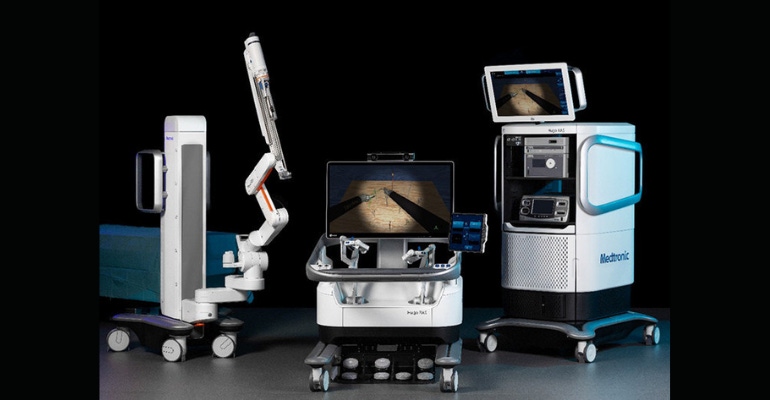October 20, 2022

Medtronic announced not one, not two, but three significant regulatory approvals for its Hugo robotic-assisted surgery (RAS) system this week.
The Dublin, Ireland-based company has received CE mark clearance to market Hugo for general surgery in Europe; a Health Canada license for general laparoscopic surgery; and Ministry of Health, Labor, and Welfare approval for urologic surgical and gynecologic laparoscopic indications in Japan.
The new system approvals and indications set the stage for significant access across Europe, North America, and Asia.
As a form of minimally invasive surgery, robotic-assisted procedures offer patients fewer complications, shorter hospital stays, and faster return to normal activities, Medtronic noted.
Together, general surgery, urology, and gynecology account for more than 80% of all robotic-assisted surgery procedures performed globally, the company said, adding that general surgery is the fastest growing segment within robotic surgery. General surgery encompasses several different surgical specialties including hernia repair, the fourth most common surgery performed globally. Medtronic also noted that Japan is the third-largest robotic surgery market in the world today.
"Receiving these important approvals paves the way for our expansion into key robotic markets," said Mike Marinaro, senior vice president and president of surgical robotics at Medtronic. "The Hugo RAS system was designed to address the barriers to robotic surgery adoption, and these approvals are significant steps in bringing the benefits of minimally invasive surgery to more patients in more places around the world."
Medtronic's expansion into robotic surgery represents a significant growth opportunity for the company.
A modular system, Hugo combines wristed instruments, 3D visualization, and Medtronic's Touch Surgery Enterprise, a cloud-based surgical video capture and management solution, with dedicated support teams specializing in robotics program optimization, service, and training. Touch Surgery Enterprise is an AI-powered platform designed to make sharing surgical video simple and provides surgeons with a powerful new training tool.
"These regulatory approvals are a major step in expanding the benefits of minimally invasive surgery to patients around the world. We truly believe that AI-assisted robotic surgery will transform the operating room," said Carla Peron, MD, chief medical officer for surgical robotics at Medtronic. "Our team is thrilled to begin partnering with more surgeons and customers to help build and grow their robotic surgery programs in this hugely important area of healthcare."
Alex Mottrie, MD, a pioneer in the field of robotic surgery and the first surgeon to perform a prostatectomy using the Medtronic Hugo Robotic Assisted Surgery System, recently shared some candid insights on the current robotic surgery landscape during a call hosted by medtech analysts at BTIG.
From a 30,000 foot view, the key differentiator between Medtronic's Hugo and Intuitive Surgical's da Vinci platform seems to come down to procedure type, according to analyst takeaways from the call. Currently, both systems are best suited for urological and gynecological procedures, however Hugo's four independent arms could eventually increase interest in using the system for general surgery and colorectal surgery, as the design allows for better abdominal access, according to Mottrie.
Mottrie founded the Orsi Academy, a multidisciplinary school in Belgium for surgeons on robotic and minimally invasive surgery and consults for hospital systems on robotic surgery. So, it should be noted that the Intuitive Surgical SP robot is not yet available in Europe, but Mottrie said he is actively awaiting its arrival. The da Vinci SP just recently scored regulatory clearance from Japan’s Ministry of Health, Labour and Welfare for use in general surgeries, thoracic surgeries (excluding cardiac procedures and intercostal approaches), urologic surgeries, gynecological surgeries, and trans-oral head and neck surgeries. As for Medtronic, Mottrie says the company is primarily focused on the development of Hugo in Europe before it turns its attention to the U.S. market. Today, about a third of his cases are completed using the Hugo system.
Hugo has four independent arms, which Mottrie says allows for greater access to the abdomen in comparison to the da Vinci system. While these arms do allow for improved positioning though, the surgeon says they can be more complex to use. However, he also said that when surgeons are proficiently trained on the system, the increased complexity is less of an issue. There were also some early software issues associated with Hugo's arms, but it's not uncommon to experience a few bugs early on, he added.
Mottrie also pointed out that Medtronic has improved the system as of late, working through some software bugs and microchip issues, and is increasing his usage relative to Intuitive Surgical's da Vinci, Zimmerman reported. Mottrie completes between 350 cases and 400 cases a year (mostly prostate surgeries) as the head of the urology department at the largest hospital in Belgium.
About the Author(s)
You May Also Like




